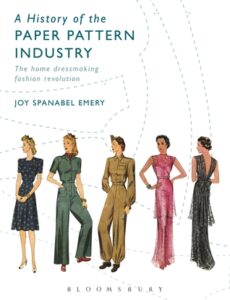 A History of the Paper Pattern Industry, Joy Spanabel Emery
A History of the Paper Pattern Industry, Joy Spanabel Emery
I don’t think this book would be of great interest to someone who isn’t interested in sewing at all, but you don’t have to actually sew to take an interest — a couple of episodes of the Great British Sewing Bee should set you up with all you need to know for background, if you feel you need to know a little more. Mostly, what you need to know is explained in the text, as the history goes through the development of early patterns from “rock of eye” to printed patterns showing various different sizes.
It seems that paper patterns have a surprising amount to tell fashion history: although paper patterns for home sewers were behind the fashion by a little, they couldn’t be that far behind or they’d be pointless, so they did follow fashion and sometimes inform it (for instance, in the length of mini-skirts). Patterns have survived well, despite the flimsy paper, because the paper was acid-free, and often systems of notches and punched holes were used instead of ink. Carefully unfolded, very old patterns are still useable and useful.
It’s surprising to me that the companies which established themselves early in the history of providing patterns for home sewers still exist! It was a little odd to meet their names back before printed patterns became possible, for instance.
The book is richly illustrated with images of the fashions and pattern-packets discussed, showing the trends through time very visually as pattern companies started putting the pattern pieces in envelopes, providing more instruction, and expanding their ranges to tempt younger sewers into following fashions. It also comes with some vintage patterns, which make no sense to me, but might interest people with a less academic interest in sewing and actually making garments.



